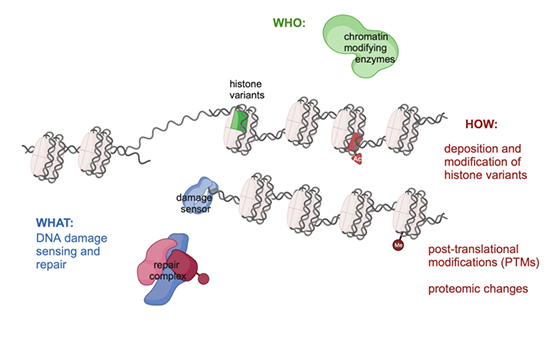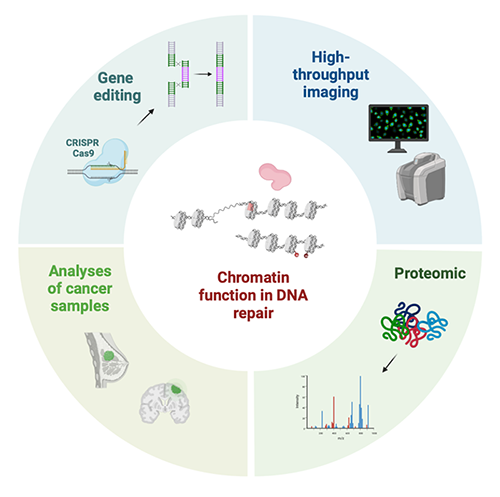Chromatin function in DNA repair
This team belongs to the UMR 9019 Genome Integrity and Cancers.
In cells, DNA is wrapped around histone proteins to constitute the nucleoprotein complex called chromatin. Through its organization and structure, chromatin contributes, among others, to the response to DNA damage (DDR), whose ultimate goal is preserving the integrity of the genome from mutations and other chromosomal aberrations. In the Rondinelli’s lab, the primary research focus is to provide a clearer understanding of chromatin’s function in DDR in human cells, since many aspects of this remain unclear as of today.
Research aim
To gain a better understanding of how chromatin-related factors participate to the response to DNA damage and how this maintains genome integrity in human cells. We also address these topics by investigating how alterations in chromatin-related factors (such as mutations or dysregulated expression) hijack the DNA damage response and induce genome instability in pathological conditions, one above all in human cancer.
Background
In cells, DNA is wrapped around histone proteins to constitute the nucleoprotein complex called chromatin. Through proper organization and structure, chromatin and its related factors safeguard genome integrity by participating to the repair of DNA damage which is generated by endogenous or exogenous sources such as radiations, chemicals and byproducts of cell metabolism. This is a critical role given the importance of genome integrity maintenance in safeguarding cell function and avoiding pathologies marked by genome instability, such as cancer.
Goals
We aim at answering broad questions: how are chromatin-related factors helping the response to DNA damage? And its corollary: how does their pathological dysfunction hijack genome integrity maintenance in human cancer cells?
Despite gaining significant knowledge in the last decades, we still lack a comprehensive understanding of how chromatin and its related factors drive proteomic, metabolic and posttranslational modification (PTM) changes at DNA lesions that are sensed upon DNA synthesis and how these regulate DNA damage sensing, the activation of DNA repair pathways and the faithful duplication of the (epi)genome (Figure 1).

Figure 1. Scheme of a broken replication fork depicting the first steps of DNA damage sensing and repair in mammalian cells (WHAT represents our research subject). WHO denotes on which chromatin-related factors we focus our studies (chromatin modifying enzymes and histone variants) while HOW summarizes the main chromatin-related events that we analyze in the response to DNA damage.
On top of this, the mechanisms through which aberrant chromatin organization and function in cancer cells hijacks genome integrity maintenance albeit sustaining cell proliferation need further dissection. Unveiling these mechanisms would highlight vulnerabilities that can be targeted to promote cancer cell killing.
Approaches
We focus on DNA damage induced by replication stress, that is represented by any endogenous or exogenous chemical/physical source that interferes with the proper advancement of the replication fork and the faithful duplication of the (epi)genome.
We study chromatin function by dissecting how proteomic, metabolic and posttranslational modification (PTM) changes upon DNA damage impact the activation of DNA repair pathways, the proper duplication of the genome and the post-synthesis restoration of the epigenome. Our methods include genome editing of cultured human cell lines, high-throughput imaging and proteomic approaches tailored to the analysis of chromatin (Figure 2).

Figure 2. Approaches setup in the lab to better dissect how chromatin regulates the sensing and repair of damaged DNA in mammalian cells.
Research projects
In the Rondinelli’s lab, research is organized along two main axes: one focused on histone variants and the other centered on chromatin modifying enzymes, also called writers and readers.
We are always looking for enthusiastic and talented people to join our team. If you are interested in working with us and want to learn more, don't hesitate to contact us!
Funding bodies

